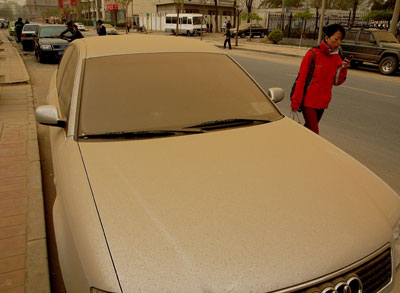In the past two weeks, Beijing has witnessed some of the capital's worst
spring weather in history. Chilly days follow hot days, rain comes after wind,
and the bad weather climaxed on Sunday night, when yellow dust covered the city
overnight.
Reports from different departments at the China-Japan
Friendship Hospital show that patient inflow increased a great deal. The
abnormal weather has led to many problems, especially with eyes, nose, throat
and skin. Meanwhile, old people, infants, pregnant women, and people with
chronic problems such as cardiovascular disorders should keep warm to prevent
problems brought on by the strong wind.

A tourist wears sunglasses and cloth mask to
ward off dust as he goes sightseeing at the Tiananmen Square in the center
of Beijing April 17, 2006. Beijing residents woke on Monday morning to
find their homes, streets and cars covered in brown dust left by the
latest of a spate of duststorms. Dusty weather is a headache for Beijing
in spring. Experts advised residents to stay indoors or wear masks when
going out for their health. [newsphoto]
|
At
the hospital, the Respiratory, Paediatrics and E.N.T departments witnessed a
sharp increase in the number of old and very young patients, while a great deal
of white-collar workers were suffering with rhinitis and pharyngitis.
"The nasal cavity has a certain filtering function, but there is too much
dirt in the air on sandstorm days, which can exacerbate respiratory illness and
allergies, and cause coughing or shortness of breath," said Su Nan, doctor of
the Respiratory Department. "Among the old and the weak, respiratory problems
can develop into pneumonia and other heart and lung problems."
Patient inflow increased 20 per cent in Su's department, with many coming
with allergic rhinitis, acute rhinitis, throat inflammation or asthma.
"With the warming of the weather, pathogens have become more active,"
explained Yang Dazhang, another doctor at the department. "When it comes to
windy weather, dust in the air carries a lot of alien objects and pathogenic
bacteria, which can enter the body, leading to running nose, nasal itching and
sneezing."

A woman walks past a car parked in
the open air and covered by dust in Beijing April 17, 2006. Dusty weather
is a headache for Beijing in spring. Experts advised residents stay indoor
or wear masks when going out for their health as the dusty weather
continues today. [Xinhua]
|
If dust enters the
body by way of mouth it can lead to throat problems, and sometimes even
inflammation in the ears.
Yang suggests wearing facemasks, scarves or caps to keep warm. Yang also
suggests avoiding crowded places due to the increase in respiratory infections
of late.
The Paediatric Department's statistics show that patient inflow was up 48.5
per cent in late March and early April compared with the same period last year.
Meanwhile the Ophthalmology Department warns people to watch for
conjunctivitis and be careful with wearing contact lenses.
"When dirt or alien objects get into the eyes, do not use the hands to rub
them as this can injure the eyes, leading to pain, blurred vision, or even
keratitis," revealed Chen Shu, a doctor with the department.
Chen suggests dealing with it in a place without wind. Some dirt can flow out
with tears, so try blinking, or lifting the eyelid gently and swinging it to
increase tear secretion. If that doesn't work then seek medical help.
The doctor also suggests wearing glasses instead of contact lens on windy and
dusty days, because, dirt can stabilize on the lens and lead to inflammation.
Beijing's windy days also lead to dryness of the skin, roughening, reddening,
or even cracking, according to Wang Chen, director of the Dermatology
Department. If those conditions persist, bacteria can get into the pores and
cause inflammation, spots or itchiness. People with allergic tendencies might
develop allergic dermatitis.
 Wang suggests wearing facemasks, or shielding the head with a gauze
scarf when going outdoors. Once indoors, you should wash the face and keep the
skin clean. People can also put on simple and mild skin-protecting cosmetics to
help keep the skin moist, so that it does not crack. For women who often use
make up, do not wear heavy or colourful makeup during windy and dusty days. If
wind borne particles blend with cosmetics, they can have a chemical reaction
affecting the skin. In these cases the skin reddens, itches or develops rashes,
people should consult a dermatologist before applying
medicines.
Wang suggests wearing facemasks, or shielding the head with a gauze
scarf when going outdoors. Once indoors, you should wash the face and keep the
skin clean. People can also put on simple and mild skin-protecting cosmetics to
help keep the skin moist, so that it does not crack. For women who often use
make up, do not wear heavy or colourful makeup during windy and dusty days. If
wind borne particles blend with cosmetics, they can have a chemical reaction
affecting the skin. In these cases the skin reddens, itches or develops rashes,
people should consult a dermatologist before applying
medicines.
(For more biz stories, please visit Industry Updates)